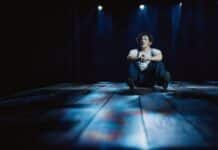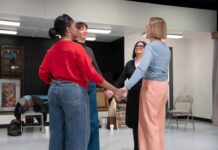Founded in 2018, The Resident Acting Company – a group of collaborating actors rooted in the classics and exploring the possibilities of what they could create by working closely together – is now presenting its inaugural fully staged production, a wild take-off on Shakespeare’s 1595-96 enchanted romantic comedy A Midsummer Night’s Dream, for a limited engagement at The Sheen Center for Thought & Culture. Directed by RAC’s artistic director Bradford Cover, six of the company members take on a total of twenty roles in their over-the-top new version, in which The Mechanicals – the inept amateur acting troupe of workmen from Shakespeare’s original, who perform Ovid’s ancient Greek tale of the ill-fated lovers Pyramus and Thisbe as part of the entertainment at the royal wedding celebration of Theseus and Hippolyta – appear not just in the play-within-a-play subplot, but are in rehearsals to tell Shakespeare’s entire interwoven story of conflicted lovers and mischievous fairies, the court of Athens and a magical forest, in the garage of the Mechanicals’ Peter Quince, who helms the show.

The cast – Rachel Botchan as Robin Starveling, Hippolyta, Hermia, and Titania; Anique Clements as Peter Quince, Helena, and Peaseblossom; RJ Foster as Tom Snout, Theseus, Demetrius, and Oberon; Carine Montbertrand as Snug, Puck, and Cobweb; Andy Paterson as Francis Flute, Lysander, Mustardseed, and Moth; and Austin Pendleton as Nick Bottom and Egeus – combines masterful deliveries of the Shakespearean text (standout performances by Botchan and Foster) with expert physical comedy and clowning (Montbertrand steals the silly scenes). There are also some clever sight gags (e.g., using a purple feather duster to represent the “love-in-idleness” pansy whose juice was dropped into sleeping eyes to make the characters “madly dote”), and segments of the actors playing makeshift props (by Charlie Cohen) and instruments (original music by PJ Ju), and performing the rustic Bergomask dance, as in Shakespeare (choreography by Grace Ann Baresich), and inviting the audience to clap along.
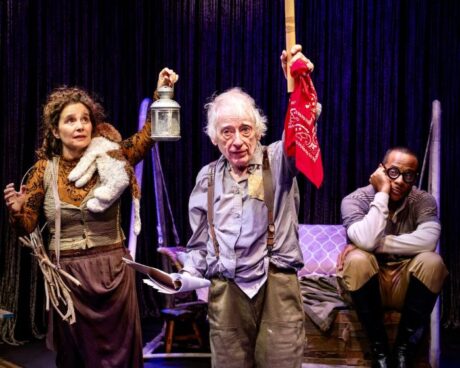
But the company’s rapid-fire shifts of characters are often confusing (expressed by the faux-exasperated Foster, frantically switching headpieces, having an attack of stage fright, and occasionally losing his temper), as are the many anachronisms of the current setting, like a cushioned outdoor swing and vintage sewing machine (set by Harry Feiner) and props, with Clements as the take-charge Quince holding a modern clipboard and Pendleton as the slow-study Bottom performing script-in-hand (and ad-libbing when he repeatedly had trouble turning the pages on the date I attended), and the illogic of the audience’s presence, interactions, and participation (random members are shown computer printouts of lines they are asked to deliver with a hand mic), in what is supposed to be the (post-modern) Mechanicals’ rehearsal in a garage, not in a theater with seating.
As with the action and characters, costumes (by Evan Riley) are a mash-up of historicizing, theatrical, and contemporary, sometimes using masks and sometimes funny hats (and, of course, the familiar donkey ears for Puck’s prank of transforming Bottom into an ass), and lighting (by Feiner) and sound (by Ju) distinguish between the scenes of the rehearsal and trigger the out-of-character breaks and segments of direct-address to the audience.
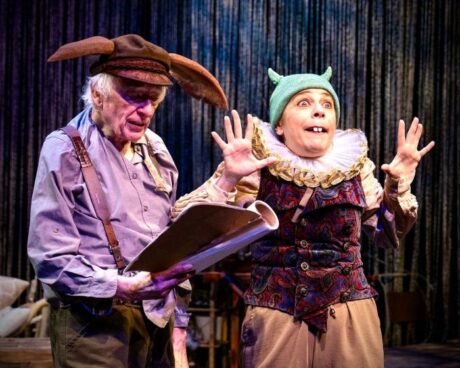
While RAC’s new irreverent vision of A Midsummer Night’s Dream is often amusing, the fractured story and characters can also be hard to follow for those who do not have a thorough knowledge of Shakespeare’s actual play and are expecting to see it. And with a running time of more than an hour and a half, many of the jokes and breaks through the fourth wall begin to feel redundant and in need of editing. But if you want to experience a metatheatrical parody of what goes into putting on a show, this not only takes you into the broken narrative but also behind the scenes, with wacky humor and immersive staging that, as advertised, tells “the whole story” from a present-day acting company’s perspective.
Running Time: Approximately one hour and 40 minutes, without intermission.
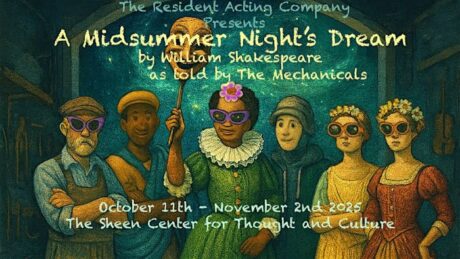
A Midsummer Night’s Dream plays through Sunday, November 2, 2025, at The Resident Acting Company, performing at The Sheen Center for Thought & Culture, The Frank Shiner Theatre, 18 Bleecker Street, NYC. For tickets (priced at $40, plus fees), go online.

